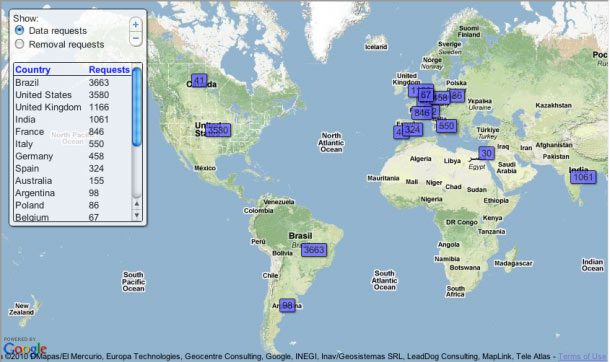Google reveals govt takedown requests

Google is publishing data on the number of requests it receives from governments to either remove content or identify specific users.

Google's data request chart (Screenshot by Tom Krazit/CNET News.com)
Google is hosting a page on its site that reveals the number of times a government has requested data on a specific user or asked Google to remove a piece of content from its network of sites, such as search, YouTube or Blogger. The page will be updated every six months and the initial data covers requests sent to Google between July 2009 and December 2009, Google's chief legal officer David Drummond said in a blog post.
Brazilian government agencies and officials filed the most requests for data from Google during that six-month period, perhaps underscoring how popular Google's Orkut social-networking service is in that country. Authorities there made 3663 requests for data on individuals and 291 requests for removal of content. Parties acting on behalf of the US Government made 3580 requests for data on individuals and 123 requests for the removal of content. Australia made 155 data requests and 17 data removal requests.
"We believe that greater transparency will lead to less censorship," Drummond wrote in the post. Google and censorship issues have been intertwined this year, with the high-profile dispute with China getting most of the attention and helping set the stage for a new US policy that encourages private companies to promote an open internet around the world.
However, Google's numbers are not nearly as transparent as they could be.
It said the numbers include requests from authorities that Google contests, but the tool doesn't break out the data for the number of times Google complied or refused requests for information on individuals. It does say how often — in general — it complies with takedown requests, but does not provide specifics. The numbers don't include requests made as part of civil court proceedings, such as any requests for content removal made as part of Google's ongoing trial with Viacom over YouTube. And China is absent from the list entirely, except for a red question mark in the content removal category.
"We would like to be able to share more information, including how many times we disclosed data in response to these requests, but it's not an easy matter," Google wrote in an FAQ accompanying the blog post. "Given all this complexity, we haven't figured out yet how to categorise and quantify these requests in a way that adds meaningful transparency, but we plan to in the future."
Few companies publish any sort of data about such requests from government agencies. Prosecutors and government officials see internet service providers, email companies and social-networking sites as having reams of potentially useful data to bolster investigations.
The announcement comes at a time when Google is under fire left and right from government and private groups over its policies around privacy, censorship and data retention. An Italian judge recently convicted three Google executives of invasion of privacy for failing to prevent a video from being uploaded to YouTube, and privacy advocates have had a field day with the fiasco over Google's Buzz launch.
Via CNET News.com